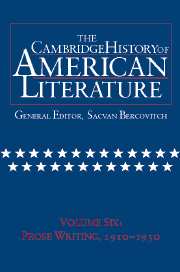Book contents
- Frontmatter
- Introduction
- A Cultural History of the Modern American Novel: Introduction
- 1 A Dream City, Lyric Years, and a Great War
- 2 Fiction in a Tme of Plenty
- 1 When the War Was Over: the Return of Detachment
- 2 The “Jazz Age” and the “Lost Generation” Revisited
- 3 The Perils of Plenty, or How The Twenties Acquired a Paranoid Tilt
- 4 Disenchantment, Flight, and The Rise of Professionalism in an Age of Plenty
- 5 Class, Power, and Violence in a New Age
- 6 The Fear of Feminization and The Logic of Modest Ambition
- 7 Marginality and Authority / Race, Gender, and Region
- 8 War as Metaphor: The Example of Ernest Hemingway
- 3 The Fate of Writing During the Great Depression
- Fictions of the Harlem Renaissance
- Ethnic Modernism
- Chronology
- Bibliography
- Index
5 - Class, Power, and Violence in a New Age
from 2 - Fiction in a Tme of Plenty
Published online by Cambridge University Press: 28 March 2008
- Frontmatter
- Introduction
- A Cultural History of the Modern American Novel: Introduction
- 1 A Dream City, Lyric Years, and a Great War
- 2 Fiction in a Tme of Plenty
- 1 When the War Was Over: the Return of Detachment
- 2 The “Jazz Age” and the “Lost Generation” Revisited
- 3 The Perils of Plenty, or How The Twenties Acquired a Paranoid Tilt
- 4 Disenchantment, Flight, and The Rise of Professionalism in an Age of Plenty
- 5 Class, Power, and Violence in a New Age
- 6 The Fear of Feminization and The Logic of Modest Ambition
- 7 Marginality and Authority / Race, Gender, and Region
- 8 War as Metaphor: The Example of Ernest Hemingway
- 3 The Fate of Writing During the Great Depression
- Fictions of the Harlem Renaissance
- Ethnic Modernism
- Chronology
- Bibliography
- Index
Summary
In Workers: An Experiment in Reality – The West (1899), Walter Wyckoff surveys the harsh consequences of being poor in a land of plenty, particularly when poverty begins to close in as something remorseless and final, enforcing a sense that one is a “superfluous human being” for whom “there is no part in the play of the world’s activity.” Dreiser glimpsed such moments as a boy and never forgot them. The diaries he kept between Sister Carrie (1900) and An American Tragedy (1925) show little sympathy for blacks and Jews and less interest in the plight of the poor than in his own string of sexual conquests. But memories of his own painful childhood stayed with him. “Any form of distress,” he once remarked – “a wretched, down-at-heels neighborhood, a poor farm, an asylum, a jail,” or people without “means of subsistence” – was sufficient to provoke something close to actual “physical pain.”
Dreiser begins An American Tragedy, his first commercial success, with Clyde Griffiths, a young boy full of yearning, enclosed by “the tall walls of the commercial heart of an American city.” He then traces Clyde’s brief rise to no great height and ends with him locked in a prison cell, waiting to be executed. Enticed by his society’s major inducements – not only wealth, status, and power, but also meretricious glamor and beauty – Clyde becomes an easy victim of its failure to provide him any values by which to live, other than hope of entering, as a member rather than as a hired hand or guest, the world of the very rich. His money-conscious, pleasure-seeking world teaches him to admire people above him and use those below him.
- Type
- Chapter
- Information
- The Cambridge History of American Literature , pp. 142 - 150Publisher: Cambridge University PressPrint publication year: 2002

